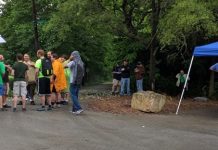 Found via TechCrunch: Lawrence Lessig writes a lengthy essay touching on what the Google Books Settlement does right, and why he believes it is a bad idea all the same.
Found via TechCrunch: Lawrence Lessig writes a lengthy essay touching on what the Google Books Settlement does right, and why he believes it is a bad idea all the same.
TechCrunch has an excellent in-depth analysis of the piece, which you should read if you do not wish to read the whole thing.
In short, Lessig first describes the hideous piecemeal licensing structure of documentary filmmaking—rather than relying on fair use, every quote or bit of music has to be cleared individually when the film is made. Then, if the film is to be reissued, it all must be cleared again.
Then Lessig discusses the Google Books settlement, what it does right, and some of its hidden implications. Lessig lauds Google for doing better than the minimum fair use requirements in its settlement (for instance, gaining the right to quote up to 20% of an in-copyright book rather than snippets), but fears the settlement as a whole may be in danger of turning book copyright into the same kind of morass as documentary film copyright.
When you send your children to a library to write a research paper, you do not want them to have access to just 20 percent of each book they need to read. You want them to be able to read all of the book. And you do not want them to read just the books they think they would be willing to pay to access. You want them to browse: to explore, to wonder, to ask questions–the way, for example, people explore and wonder and ask questions using Google or Wikipedia.
The one flaw I see here is that Lessig seems to be assuming that Google Books will replace the use of printed books altogether. Even if you can only view 20% of a book in Google, there is no reason you should not be able to find the same book in hardcover in your library stacks, or request it through interlibrary loan if it is not there. Maybe it will take longer, but it is what you would have to do without Google anyway.
Lessig calls for copyright reform, and that is a call I can certainly agree with in any event. But I’m cynical enough now to doubt it will ever actually happen































